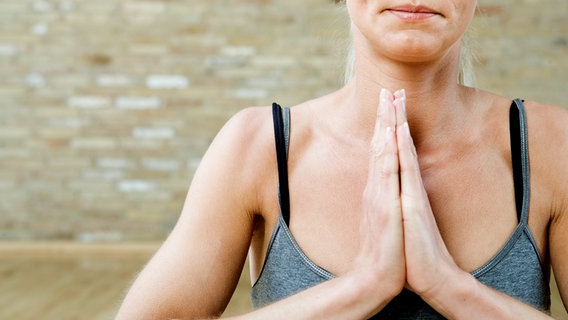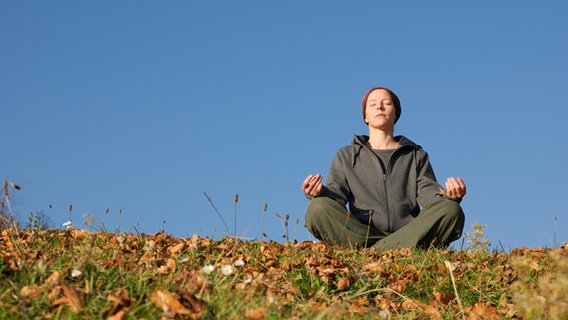Status: 04/13/2023 4:52 p.m
Mindfulness courses, yoga and meditation: relaxation techniques are popular and in demand. More and more people want to use it to reduce stress and thus counteract health problems.
one Study by Techniker Krankenkasse According to this, every fourth person in Germany often feels stressed. Those affected are under time pressure, do not take breaks and overwhelm themselves. In addition, there is frustration because what was planned does not work, as well as uncertainty. The result: the body is under massive stress.
Escape response releases stress hormones in the body
Our body’s reactions to stress are based on evolutionary biology – they are intended to prepare people for a fight or flight response in order to deal with dangerous situations. These reactions work at lightning speed because energy is needed immediately for the upcoming fight for survival: the sympathetic nervous system, part of the autonomic nervous system, is activated, the adrenal glands release the stress hormones adrenaline, noradrenaline and cortisol. Blood pressure and pulse rise, breathing becomes faster, muscles tense. The result: You can react faster and better.
Constant stress causes irritability and sleep disorders
Getting stressed for a short time is not a bad thing. However, if you are under constant stress, the stress hormones become a problem. Research suggests that persistently high cortisol levels could, among other things, damage nerve cells in the hippocampus – a part of the brain responsible for learning, memory and emotions.
Long-term too much adrenaline can lead to heart failure and excessive blood sugar levels. Symptoms of prolonged stress can include irritability, nightmares, Sleep disorders, gastrointestinal problems and high blood pressure.
Burnout and weakened immune system due to stress
In addition, constant stress weakens the immune system and promotes it back pain. Constant stress also threatens the feeling of losing control – this is very unhealthy for the human psyche and can lead to anxiety disorders or exhaustion depression, the so-called burnout.
Taking a deep breath helps with acute stress
Meditation and yoga can reduce stress.
If you react correctly in a stressful situation, you can reduce stress. The Stress Contingency Plan: Breathe – three deep breaths, three deep breaths. It sounds simple, but it has amazing effects: Deep inhalation and exhalation can noticeably lower blood pressure and heart rate after just one to three breaths.
Mental techniques for relaxation in everyday life
Mental exercises such as mindfulness training, meditation, autogenic training and yoga work on various messenger systems in the body, but also on the vegetative nervous system, which represents a kind of control center in the central nervous system and controls vital processes such as breathing, heartbeat and blood pressure.
- Meditation is a mental training that is intended to help you become calmer and more relaxed – not only during practice, but also during stressful everyday situations. What all meditation methods have in common is that the practitioner concentrates on one thing. Conscious breathing is the focus of many exercises.
- Yoga is an Indian teaching that includes mental and physical exercises.
- MBSR stands for “Mindfulness-Based Stress Reduction”, i.e. stress management through mindfulness. The method combines traditional meditation exercises with breathing exercises and yoga.
- autogenic training: Like meditation, autogenic training is a mental relaxation technique. With this light form of self-hypnosis, the body is switched to recovery, heartbeat, blood pressure and breathing can be specifically influenced.
Mental relaxation techniques to reduce stress
The mental training specifically activates the parasympathetic nervous system, which plays the role of the resting nerve in the vegetative nervous system. This means that it slows down certain body processes such as breathing and heartbeat, reduces muscle tension and allows you to relax and recover.
Just as the body responds to stress with the typical fight or flight reaction, i.e. increases heart rate and blood pressure, mental exercises can consciously cause the opposite and reduce stress:
- The release of the stress hormone adrenaline is reduced.
- The cortisol level drops – even by 50 percent with some meditation exercises Studies by the Max Planck Institute for Human Cognitive and Brain Sciences in Leipzig show.
- After just eight weeks of meditation training with a daily duration of 45 minutes, scientists were able to observe a significant thickening of the gray matter in the hippocampus.
- Relaxation methods such as yoga and meditation can also help with cardiological complaints such as heart rhythm disorders and high blood pressure. studies show that relaxation methods can lower heart rate and blood pressure.
Improve concentration with meditation
Meditation can not only reduce the release of stress hormones, but also positively influence the ability to concentrate and the perception of pain:
- MRI scans show that during mindfulness meditation, the area of the brain known as the prefrontal cortex, which controls the ability to concentrate, is particularly active. The more active he is, the easier it is to focus attention on one thing. At the same time, the area in the brain that keeps triggering the thought carousel shuts down. Those who meditate regularly will not be easily carried away by distracting thoughts in everyday life.
- Meditation changes the perception of pain, as brain researchers found out: Those affected feel the pure pain more intensely, but the suffering or the negative assessment of the pain can be reduced through meditation.
Meditate properly via app and in a yoga class
Meditation can be learned – in a course, in private lessons, or on the Internet via podcast or meditation app. An example of a mindfulness meditation is the Body-Scan: Lying down, meditators practice staying focused on themselves and gradually feeling their whole body – from their feet to their heads.
Anyone who needs movement to let go is in good hands in the yoga class: With meditative movements and breathing exercises, it is easier to switch off your thoughts and concentrate entirely on your own breathing, for example.
Reduce stress with sport and exercise
Anyone who regularly ensures relaxation in everyday life learns to become generally calmer and to react more calmly in stressful situations. With various body techniques, physical relaxation can also bring about mental relaxation. Examples of these techniques are:
- Tai-Chi: In the so-called “internal martial arts” from China, the body builds up and releases tension in various styles and exercises.
- Qigong: With the 3,000-year-old Chinese technique, flowing movements and calm breathing are said to make the practitioner feel more vital and balanced. The movements are connected with inner images and little stories. They stimulate the circulation, the heart and muscles work, the happy hormone dopamine is released and strengthens the body’s defenses against stress. In addition, Qigong has a meditative effect through flowing breathing and concentration, and strengthens self-awareness and compassion in the brain through activation of the hippocampus.
- Pilates: Similar to yoga, it is a full-body workout that primarily strengthens the deep core muscles. Conscious letting go should help to detect and release tension.
- Progressive Muscle Relaxation According to Jacobsen: Practitioners tense different large muscle groups of the body and release them again after a short time. Due to the constant alternation of tension and letting go, the feeling of relaxation is perceived more and more intensively. Many studies show that tensing and relaxing different muscle groups reduces stress symptoms such as palpitations, sweating or tremors. This method also works great in acute stress situations: simply clench your fist or tense your lower leg inconspicuously – and let go again.
- To sing: When you sing, you automatically breathe deeper and more intensely. Studies have shown that music reduces the stress hormone cortisol. In addition, well-known songs can awaken positive memories and associations – and that distracts and relaxes, not only at Christmas time.
- Movement: In general, sport and moderate exercise – preferably in the fresh air – are an effective means of reducing stress and counteracting high blood pressure, for example.
experts on the subject
Further information



